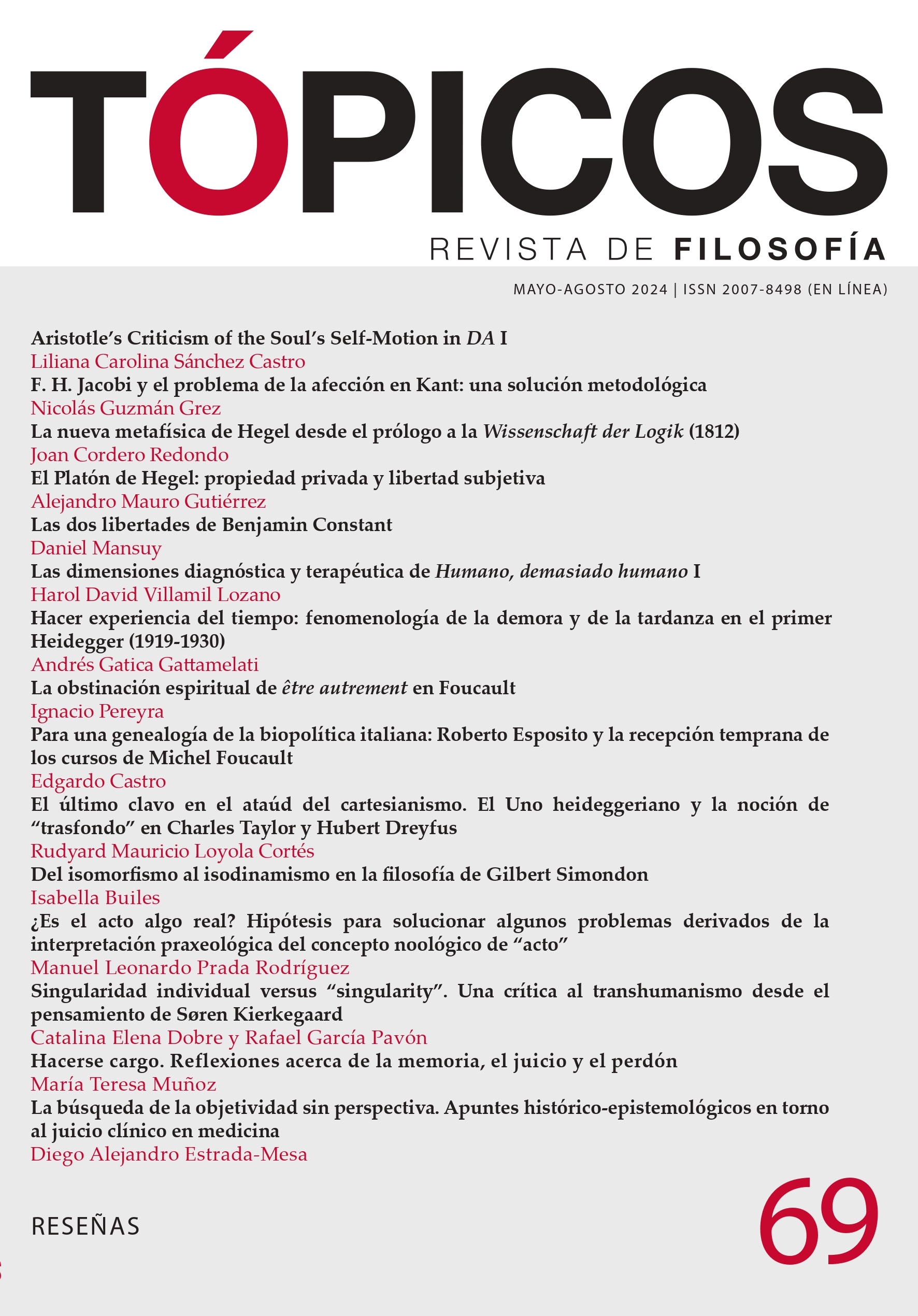Publicado 2024-04-04
Palabras clave
- Isaiah Berlin,
- Benjamin Constant,
- libertad,
- republicanismo
Derechos de autor 2024 Tópicos, Revista de Filosofía

Esta obra está bajo una licencia internacional Creative Commons Atribución-NoComercial-SinDerivadas 4.0.
Cómo citar
Resumen
Este artículo relativiza la tesis de que Benjamin Constant es un antecedente directo de la distinción entre libertad positiva y negativa de Isaiah Berlin. Según aquella postura, habría una línea clara entre Dos conceptos de libertad, de Berlin, y el Discurso de Constant. En un primer momento, refiero al modo en que Berlin remite a Constant para dar cuenta de su distinción. Después examino una dificultad relevante que enfrenta la filiación propuesta por Berlin, que remite al tono republicano de Constant. En la tercera parte, examino el pensamiento de Constant, para tratar de determinar el papel que juega ese tono republicano, lo que, a su vez, resulta indispensable para medir su distancia con Berlin. Concluyo con algunas reflexiones en torno a la relación entre ambos autores.
Referencias
- Aguilar, E. (1998). Benjamin Constant y el debate sobre las dos libertades. Revista Libertas, 28, 1-26.
- Aron, R. (2006). La définition libérale de la liberté. En R. Aron, Les sociétés modernes. (pp. 627-646). PUF.
- Berlin, I. (1990). En toutes libertés. Entretiens avec Ramin Jahanbegloo. Félin.
- Berlin, I. (1998). La revolución romántica: una crisis en la historia del pensamiento moderno. En I. Berlin, El sentido de la realidad. (pp. 245-279). P. Cifuentes (trad.). Taurus.
- Berlin, I. (2000). Cuatro ensayos sobre la libertad. J. Bayón (trad.). Alianza.
- Berlin, I. (2015). Las raíces del romanticismo. S. Marí (trad.). Taurus.
- Constant, B. (1829). Mélanges de littérature et de politique. Pichon y Didier.
- Berlin, I. (1957). Œuvres. Gallimard.
- Berlin, I. (1991). Fragments d’un ouvrage abandonné sur la possibilité d’une constitution républicaine dans un grand pays. Aubier.
- Berlin, I. (1997). Écrits politiques. Gallimard.
- Berlin, I. (2013). De la force du gouvernement actuel de la France et de la nécessité de s’y rallier. Flammarion.
- De Dijn, A. (2008). French Political Thought from Montesquieu to Tocqueville: Liberty in a Levelled Society? Cambridge University Press.
- Fontana, B. (1991). Benjamin Constant and the Post-revolutionary Mind. Yale University Press.
- Gauchet, M. (1997). Benjamin Constant : l’illusion lucide du libéralisme. En B. Constant, Écrits politiques. (pp. 11-110). Gallimard.
- Godoy, O. y Constant, B. (1995). Selección de textos políticos de Benjamin Constant. X. Godoy (trad.). Estudios Públicos, 59, 1-68.
- Hayek, F. A. (2020). Los fundamentos de la libertad. J. V. Torrente (trad.). Unión Editorial.
- Hobbes, T. (2007). Leviatán. M. Sánchez (trad.). Fondo de Cultura Económica.
- Hoffmann, E. y Goldhammer, A. (2009). The Theory of the Perfectibility of the Human Race. En H. Rosenblatt (ed.), The Cambridge Companion to Constant. (pp. 248-272). Cambridge University Press.
- Holmes, S. (1994). Benjamin Constant et la genèse du libéralisme moderne. O. Champeau (trad.). PUF.
- Holmes, S. (2009). The Liberty to Denounce. En H. Rosenblatt (ed.), The Cambridge Companion to Constant. (pp. 47-68). Cambridge University Press.
- Jainchill, A. (2012). The Importance of Republican Liberty in French Liberalism. En R. Geenens y H. Rosenblatt (eds.), French Liberalism from Montesquieu to the Present Day. (pp. 73-89). Cambridge University Press.
- Jennings, J. (2009). Constant’s Idea of Modern Liberty. En H. Rosenblatt (ed.), The Cambridge Companion to Constant. (pp. 69-91). Cambridge University Press.
- Kalyvas, A. y Katznelson, I. (2008). Liberal Beginnings: Making a Republic for the Moderns. Cambridge University Press.
- Lamberti, J.-C. (1983). De Benjamin Constant à Alexis de Tocqueville. Revue France-Forum, 203(4), 19-26.
- Lefort, C. (1986). Réversibilité : liberté politique et liberté de l’individu. En C. Lefort, Essais sur le politique. XIXe – Xxe siècles. (pp. 215-236). Seuil.
- Locke, J. (1997). Dos ensayos sobre el gobierno civil. F. Giménez (trad.). Austral.
- Manent, P. (1980). Aux origines du libéralisme : Benjamin Constant. Commentaire, 11, 483-491.
- Manent, P. (1987). Histoire intellectuelle du libéralisme. Hachette.
- Manent, P. (2001). Les libéraux. Gallimard.
- Mitchell Lee, J. (2002). Doux Commerce, Social Organization, and Modern Liberty in the Thought of Benjamin Constant. ABC, 26, 117-149.
- Panebianco, A. (2009). El poder, el Estado y la libertad. La frágil constitución de la sociedad libre. J. M. de la Fuente (trad.). Unión Editorial.
- Pettit, P. (1997). Républicanisme. Une théorie de la liberté et du gouvernement. Gallimard.
- Rolland, P. (1981a). Equivoque du libéralisme. À propos de Benjamin Constant. Commentaire, 15, 411-418.
- Rolland, P. (1981b). Equivoque du libéralisme. À propos de Benjamin Constant (suite et fin). Commentaire, 16, 603-610.
- Raynaud, P. (2020). Benjamin Constant. Heurs et malheurs de la liberté des modernes. Commentaire, 172, 851-858.
- Rosanvallon, P. (1985). Le moment Guizot. Gallimard.
- Rosenblatt, H. (2003). Commerce et religion dans le libéralisme de Benjamin Constant. Commentaire, 102, 415-426.
- Serrano, E. (2014). ¿Libertad negativa vs libertad positiva? Andamios, 11(25), 217-241.
- Siedentop, L. (2012). Two Liberal Traditions. En R. Geenens y H. Rosenblatt (eds.), French Liberalism from Montesquieu to the Present Day. (pp. 15-35). Cambridge University Press.
- Skinner, Q. (2004). La libertad antes del liberalismo. F. Escalante (trad.). Taurus.
- Spitz, J.-F. (1995). La liberté politique, Essai de généalogie conceptuelle. PUF.
- Starobinski, J. (1989). Le mot civilisation. En J. Starobinski, Le remède dans le mal : critique et légitimation à l’âge des Lumières. (pp. 11-59). Gallimard.
- Strauss, L. (1989). Relativism. En L. Strauss, The Rebirth of Classical Political Rationalism. (pp. 13-26). University of Chicago Press.
- Taylor, C. (1985). What’s Wrong with Negative Liberty? En C. Taylor, Philosophical Papers. II. (pp. 211-229). Cambridge University Press.
- Tocqueville, A. (1992). De la démocratie en Amérique. Gallimard.
- Todorov, T. (1997). Benjamin Constant : la passion démocratique. Hachette.





